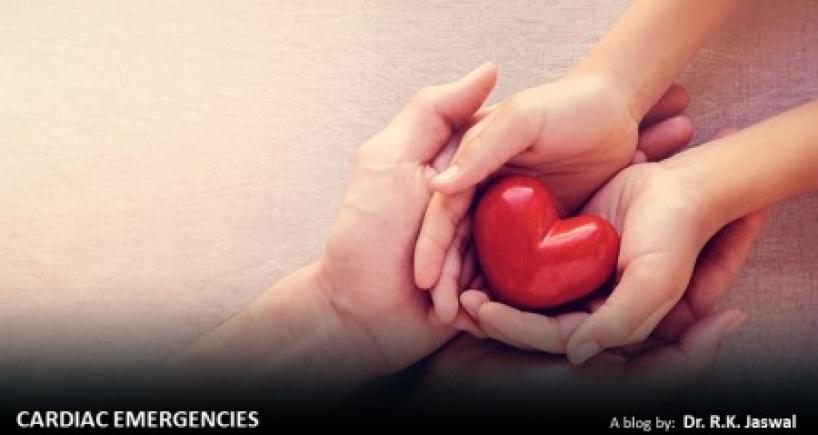
Cardiac Sciences
Cardiac Emergencies
Dr. Rakesh Kumar Jaswal Sep 03, 2019

Heart Attack (STEMI) comes like a bolt from the blue as 86% of the patients are absolutely asymptomatic prior to the heart attack! When it comes, it hits the victim hard. Even if the patient survives, the major damage to the heart is done in the first 2 hours (golden hours) after its onset. That is why, the heart is equated to the heart on fire and the outcomes are greatly influenced by the quick (within golden hour) and effective dousing of the flamer.
When I was pursuing my MD (Medicine) in 1985, there was no treatment for a heart attack across the globe. At that time, 50-79% of the victims of heart attack used to die. In last 34 years, an excellent treatment of heart attack has evolved and if we do everything right, the mortality after major heart attack can be very low and more than 90% of the victims can lead a high quality of long life. Those who are not lucky enough, their family members always wonder as what better they could have done to avoid this irreparable loss. Let’s try to understand what we can do in case any of our family members suffers a heart attack so that we are forearmed to face this catastrophe.
Heart attack normally presents as pain or pressure or discomfort or just tightening in the middle of the chest, spreading to both sides of the chest(Lt>Rt). Many a times it presents as indigestion or shortness of breath or sweating and nervousness. In elderly and Diabetics, there can’t be a silent heart attack.
Once recognized, the ideal treatment is primary angiography (P.P.C.I) which means emergent coronary angiography followed by coronary angioplasty with or without stenting of the artery which is responsible for heart attack. That means we counter attack the heart attack and restore the blood flow in the heart attack related artery. Results of PPCI are significantly influenced by time from onset of heart attack, door to balloon time, operator experience and PPCI. Capable hospital volumes, usage of thrombo suction catheter and other high end devices as well as transradial access. Let’s discuss them one by one.
If the patient has suspected symptoms, of heart attack as discussed above, he has to immediately get an ECG done and if it shows heart attack, then rush to the best hospital which treats maximum number of heart attack patients and reach that hospital within golden hour. Choose Cardiologist who has the largest experience as the trials have clearly shown that results of PPCI are greatly influenced by the experience level of the operator. Prefer transradial PPCI as several trials like SCAAR, RIFLE, STEACS, HORIZON, AMI and RIVAL have clearly shown excellent results and patient comfort when they undergo established transradial PPCI. We have established Transradial PPCI at Fortis Hospital, Mohali since 2005 and we have the largest experience in this technique in the entire North India
Door to Door Balloon Time(DTBT)
DTBT is defined as the time taken from the time patient reaches at the door of the hospital to time his artery is opened by ballooning and blood circulation is restored. Ideal DTBT should be less than 90 minutes. Every thirty minutes further delay can increase mortality by 8% to minimize DTBT at Fortis Mohali we have put in place.
STEMI Protocol (centrally monitored by other organization) which drastically shortens time spent in initial evaluation in triage, admission formalities and transfer from triage(Emergency) to the Cathlab
At times, we need advanced imaging techniques like OCT(optical Coherence Tomography) and physiological assessment techniques of FIR. All these advanced and latest techniques are readily available on shelf and routinely utilized to achieve best quality results of PPCI at our hospital. PPCI is virtually dousing flames in a heart, which is on fire due to a heart attack. How quickly and effectively, we have extinguished the fire will determine patient’s long term survival and quality of life.
Interventional cardiology team and paramedics in the Cathlab.
Being one of the highest volume centers with the most experienced transradial operators in this part of the country, we perform angiography and PPCI very quickly to minimize the DTBT.
Duality of PPCI – It is another major factor which influences outcomes of the PPCI. Sometimes the operator needs advanced gadgets to handle tough and calcified blocks causing heart attack. The instrument which is used to drill and soften this stony hard calcified blocks is called Rotablator. We have the highest experience in Rotational Atherectomy in this region.
At times, we need advanced imaging techniques like OCT(optical Coherence Tomography) and physiological assessment techniques of FIR. All these advanced and latest techniques are readily available on shelf and routinely utilized to achieve best quality results of PPCI at our hospital. PPCI is virtually dousing flames in a heart, which is on fire due to a heart attack. How quickly and effectively, we have extinguished the fire will determine patient’s long term survival and quality of life.
Categories
Clear allMeet the doctor

Dr. Rakesh Kumar Jaswal
DIRECTOR & HOD CARDIOLOGY | Fortis Mohali
- Cardiac Sciences | Interventional Cardiology
-
37 Years
-
1250



















